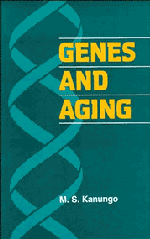3 - Chromatin
Published online by Cambridge University Press: 22 March 2010
Summary
In multicellular organisms, the problems of transmitting information stored in the DNA from cell to cell and from generation to generation are enormous. A diploid (2N) human cell has about 7 picograms (pg) of DNA which is distributed among 23 pairs of chromosomes. The total length of the DNA of 23 pairs of chromosomes is about 2 meters. Therefore, it has to be highly compacted in order to be accommodated within a nucleus whose diameter may range from 5 to 8 μ. In the highly condensed metaphase chromosomes of a liver cell, the DNA is compacted about 10,000-fold (Pienta, Getzenberg & Coffey, 1991). Approximately 3 × 109 base pairs (bp) of DNA are distributed among 23 chromosomes. Only 50,000 to 100,000 genes that are coded by nearly 5 × 107 bp of DNA or 3%–5% of the total DNA are estimated to be functional. So nearly 95%–97% of the DNA in a human cell has no known function.
The DNA in eukaryote chromosomes exists as a complex, unlike that in prokaryotes, mitochondria, and plastids, with two types of chromosomal proteins, histones and nonhistone chromosomal (NHC) proteins, forming a supramolecular complex called chromatin, the genetic apparatus of eukaryotes. The three components – DNA, histones, and NHC proteins – are present approximately in equal proportions. Various types of RNA are also found in the chromatin, but they occur as transcription products of DNA and are not structural components of the chromatin.
- Type
- Chapter
- Information
- Genes and Aging , pp. 55 - 114Publisher: Cambridge University PressPrint publication year: 1994



